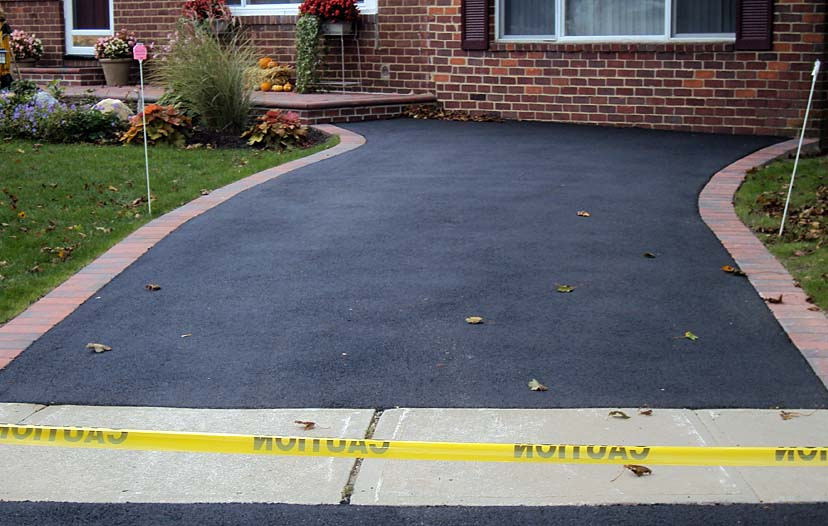Asphalt Driveway Sealing – Ultimate Protection Guide for London ON Homeowners
Your driveway is more than a path to the garage; it is a major investment and a key part of curb appeal. Applying Asphalt Driveway Sealing is the single most effective way to safeguard that investment. This in-depth guide from EMESA covers how sealing works, why it adds value, and when to schedule service for the best results.
What Is Asphalt Driveway Sealing?
Asphalt driveway sealing involves applying a protective coating over cured asphalt pavement. Once dry, this layer shields the surface from ultraviolet rays, moisture, oil spills, and chemical damage. Proper Asphalt Driveway Sealing prevents oxidation and keeps the material flexible, extending the lifespan of your driveway. A newly sealed driveway also regains its rich black appearance, dramatically improving curb appeal.
Four Powerful Benefits of Asphalt Driveway Sealing
Extended Lifespan
Sealing your driveway protects it from rain, snow, ice, and road salt. EMESA’s high-grade sealants reduce cracking, potholes, and early deterioration, helping your investment last longer.
Enhanced Visual Appeal
A fresh coat of sealant transforms faded grey asphalt into a bold, sleek black finish. Browse our impressive gallery to see real EMESA projects that combine protection with beauty.
Cost-Effective Maintenance
Asphalt driveway sealing is inexpensive compared to costly repairs or early replacement. Spending a little now on preventive sealing saves thousands later.
Superior Water Resistance
Water is asphalt’s worst enemy. Sealing fills microscopic pores, preventing rain and melting snow from seeping into the structure. This lowers the risk of freeze-thaw damage and keeps your surface smoother for winter maintenance.
How Often Should Asphalt Driveway Sealing Be Done?
Most London, ON driveways benefit from Asphalt Driveway Sealing every two to three years. Traffic volume, sun exposure, and the original quality of the asphalt influence exact timing. Check your driveway each spring—if water no longer beads on the surface or you notice fading, it’s time to reseal. EMESA can help schedule routine maintenance through our contact page.
Choosing the Right Sealant Product
Different types of sealants offer distinct advantages:
-
Asphalt Emulsion – Flexible, eco-friendly, and ideal for residential properties
-
Coal Tar – Superior chemical resistance but strong odor; often used in commercial lots
-
Acrylic – Premium option with outstanding color retention and surface gloss
At EMESA, we recommend the best solution for your specific driveway needs during a free consultation.
Should You DIY or Hire Professionals?
While some hardware stores sell DIY kits, achieving professional results is difficult without training. Hiring EMESA ensures:
-
Complete surface preparation using power blowers and pressure washers
-
Proper crack filling and minor repairs before sealing
-
Even application with commercial-grade sprayers or squeegees
-
Traffic control and full cleanup post-application
Our asphalt driveway sealing services guarantee a flawless finish that maximizes driveway life and appearance.
How to Prepare for Professional Asphalt Driveway Sealing
Clear the Surface
Sweep or blow off all debris, and remove oil stains using approved cleaners.
Repair Damage
Patch potholes and fill significant cracks before sealing to ensure an even finish.
Check the Forecast
Sealing requires dry conditions and temperatures above 10°C. EMESA schedules jobs around London’s unpredictable weather to guarantee perfect results.
Restrict Access
Block driveways from vehicles and pedestrians for at least 24 hours after sealing to allow proper curing.
EMESA’s Asphalt Driveway Sealing Advantage
Local Experience
Our team understands the unique challenges of London, Ontario’s climate and customizes solutions for every client.
Premium Sealants
We use polymer-enhanced formulas designed for maximum durability in Canadian weather.
Transparent Pricing
All quotes are detailed and upfront, so you know exactly what to expect—no hidden charges.
Exceptional Service
We back our work with a satisfaction guarantee and provide ongoing maintenance support through our FAQ section.
Conclusion: Protect Your Investment with EMESA
Asphalt driveway sealing is more than a cosmetic upgrade—it is essential protection for your property’s most used outdoor surface. Proper sealing extends lifespan, saves money, and keeps your home looking beautiful. Trust EMESA’s team to deliver expert service tailored to your needs. Ready to give your driveway the care it deserves? Visit our website to request your free quote today.











